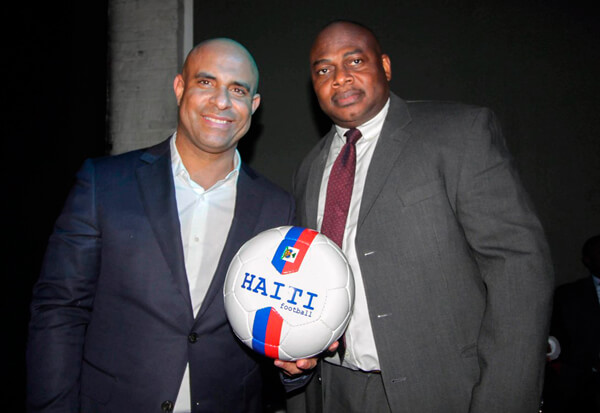In January 2010, Haiti was severely struck by a devastating earthquake that literally buried a quarter million of our compatriots in the fallen debris of destroyed homes leaving an additional one million homeless. This month marks the 6th anniversary of this catastrophe. Unfortunately, instead of commemorating a national recovery, the country is now facing a political roadblock that will undoubtedly exacerbate the existing financial, social and environmental crisis of the post-earthquake period.
After the results of recent national elections were announced, it became evident that our people have again been denied their rights to elect a leader of their own. Just like in 2010, a silent “coup d’etat” is being orchestrated by the present government using a pre-ordained candidate to comply with the selfish dictates of the traditional Haitian oligarchy. At this opportune moment, we were expecting our international benefactors to serve as a collective political conscience to denounce such an abuse of power. Instead, they seem to act as a rallying voice of support of this brazen disregard for the people’s sacred rights to fair representation. Even prior to the findings of the special commission created to investigate the widespread fraudulent maneuvers, our so-called independent observers from the UN, U.S. and the EA have all publicly sided with the government’s decision to ignore the loud cry of the people for free and fair elections. It is even more surprising to think that the U.S., the world’s top policeman against violation of basic human rights, is itself embroiled in what amounts to a flagrant abrogation of the people’s democratic freedom in Haiti.
In Haitian politics, this phenomenon is nothing new. During our 210-year history as a nation, there has always been a form of ruthless competition between individuals with appetite for unlimited and unaccountable power. In a society such as ours, defined by an extremely polarizing inequality, the individual “well-being” has always been the driving force behind most political aspirants. As a matter of fact, the ruling class has traditionally used their economic power to maintain permanent control over the institutions of government. In so doing, they are able to generate a class warfare to crush any attempt on the part of the oppressed to unite behind any political movement that threatens to erode their imperial class status as if it was a birthright privilege. At all cost, they want to preserve their position even if it means being totally unresponsive to the basic human needs of the underclass. The present power hierarchy, as we know it, is built to perpetuate this morally and spiritually corrupt model of governance designed only to secure “self- worth” with no interest in national economic growth. It is time to realize that, unless we fix our deeply uneven social fabric, this so-called “democracy at play” will continue to be a monopoly game played solely for “power and privilege”, the automatic rewards of the presidency of Haiti. Money and personal wealth have become the inner urges pushing so many, with or without the proper requisite, to enter this free, unrestricted popular contest every five years.
Five years ago, I published via the internet an article predicting that Martelly, despite his obvious lack of traditional conservative values, could have been a true disciple of change. As a popular band leader, notwithstanding his youthful exuberances, his musical repertoire did contain a few atoning lyrics that decried the suffering of our people. During his pre-campaign era, he publicly made serious petitions to our elected officials appealing to their sense of duty to rebuild our disjointed communities and improve the lives of our citizens. At the time, I gave him the benefit of the doubt wishing that he will use his natural ability to steer us in a different, more progressive direction from the imperial politics of the past. It is therefore not surprising that Martelly’s political inexperience also plays to his eventual downfall as a weak leader. When he could not handle the disciplined transparency and the logic of key decisions required of all great leaders, he resorted to a soft form of authoritarian tactic, dubbed democratic centralism using the power of the office of a democratically elected president to govern by decree and formulate his own succession planning. All in all, he completely switched from his original campaign promise of being the “defender of the masses” to becoming a “new member of the select few” immersed in the same old culture of individualism, greed and self-enrichment from the country’s meagre resources. Unfortunately, his legacy will no longer be the flamboyant character “sweet mickey” the entertainer, but a leader who turned our post-quake recovery opportunities into a nightmarish experience marked by tumultuous street demonstrations, a continuous era of carnival atmosphere, faked elections, strikes, constant public outrage at his openly vulgar outbursts unbefitting the office of the presidency. While he has been able to accumulate substantial personal wealth, he is leaving behind a large majority of people in pains with the same symptoms of extreme poverty, a monumental human challenge that forces us to depend on handouts, food programs and foreign medical missionaries for our very survival as a country.
It is fair to say that, in the end, he is no better than all his predecessors he criticized so sharply during his own presidential campaign five years ago.
I can sum up his five-year term in office in terms of action or inaction as follows:
•Marked income concentration in the top two percent of the traditional elite causing extreme inequality.
•In lieu of his promise of economic activities to other parts of the country (decentralization), he has instead instituted a popular movement of expanding “Carnivals” festivities to other cities on a bi-annual basis. In so doing, he used music and unnecessary holidays to enhance his popularity among the nation’s workforce as a pleasure-seeking president.
•Marked rise in food and housing prizes
•Instead of eliminating tent cities, he has relocated them on the outskirts of the capital… “loin des yeux, loin du coeur”
•Failure to hold constitutionally-mandated parliamentary elections leading to dissolution of both chambers under his watch
•Ruling by presidential decree and appointment of a prime minister without a Parliament
•“Faked elections” orchestrated by his own government leading to the present electoral crisis
•Post-quake recovery failure: expenses totaling close to $8 billion with no financial accountability.
•Unemployment, homelessness and social inequities unchanged
•Security and crime statistics unchanged, the phenomenon of kidnapping resurfaced
•Diaspora integration still an elusive undertaking despite his original campaign promise to enact dual citizenship. Taxation on direct money transfer without any degree of transparency and information as to the real beneficiaries of such a form of arbitrary direct taxation on Haitian immigrants.
•Cholera epidemics still evident by the increasing number of victims for such a curable contagion after more than four years.
•Private and public investments failed to produce job creation with unemployment as high as it was at the beginning of his term
•Charity continues to be the main economic model with NGOs accounting for most economic activities in the country
•Environmental degradation represents a major failure of this administration, given the opportunities of new technology. Environmental damage due to improper waste management and disposal, poor water supply protection from hazardous chemical materials and lack of emergency preparedness after so many natural disasters constitute major failures.
To the neglect of our decrepit infrastructure, social disintegration, catastrophic public health system, water scarcity, environmental degradation and financial collapse, we continue to rely on the notion that only through a Mandella-style dynamic can Haitians achieve a normative life orientation. As a result, we tend to use considerable amount of time and intellectual resources toward implementing this “messiah” concept of transformation. Obsessed with idea of electing or selecting the ideal president every five years, we have failed to prioritize the pressing needs of our people. To paraphrase the great Einstein, “we should not expect different results if we continue to use the same exact method of doing things.” In fact, the next president will be a product of the same old political template. He is therefore pre-programmed to continue to do “business as usual.” Any significant change would require a serious, in-depth analysis into the structural causes of our many failed attempts at installing a stable democratic governance system in the past 50 years.
Now that the opposition furnaces are at their highest boiling point, let’s take time out and use the stillness of a moment of reflection to soothe our troubled conscience. Unfortunately, time constraints usually lead to expedient, irrational and incendiary behaviors. At all cost, we need to resist any disruption-prone reaction that always ends up hurting the livelihood of the very people we are defending. Our main weakness lies in our tendency to direct our anger at each other. We definitely need to end this culture of divisiveness. Without a doubt, we desperately need to tap into the greatest intellectual and financial resources our Haitian Diaspora represents to the country. As long as we continue the exclusionary policy that divides us into nationals and expatriates, the president-elect will have no choice, but to dance to the drumbeat of the same limited number of “movers and shakers” of the local economy. Consolidating our worldly dispersed human treasures is our only way to achieve self-reliance and real national sovereignty. No matter how sincere and well-intentioned our successful candidate might be, his five-year plan of national development as instructed by our de facto financing authority will continue to benefit the few at the expense of the overwhelming majority of Haitians. Our national interest is not necessarily aligned with what our charity fund managers perceive as best for our economic well-being. Our only salvation force is still outside the country, some of the brightest minds and loyal souls waiting for the welcoming mat to help change the balance of power.
As Haitians living in distant shores, we too need to stop the long simmering conflict between us (the Diaspora) and them (the Haitian ruling class). There is no rational basis for such a dueling over artificially-conceived, identity-based differences among people from the same, exact cultural background. The bourgeois hegemony, in the context of the larger social world order, is not unique to the Haitian society. Its significance continues to dominate the Haitian psyche largely because of our failure to evolve from a chronically poor economy state where the overall existing balance of power is inextricably linked to a normalized system of social inequities. Like us, the Haitian oligarchy is also threatened by the specter of a continuing erosion in Haiti’s buying power in the present world economy. In healthier countries where the socio-economic structure is less polarized, there is a commonality of purpose among people from all social strata, the working class, the intermediate, and even the privileged upper class working side by side, in harmony, to alter the scourge of poverty that affects us all.
All of us, Haitians at heart, should share a sense of alarm in the face of the present social, political, emotional and financial turmoil. Let’s launch a sort of a national liberation movement to lift our country out of poverty and elevate it to a level where the international press can finally use a more flattering headline to describe us “Haiti, the most socio-economically improved country in the western hemisphere.”
All of us, Haitian immigrants, nationals, working class, middle class, underclass, dark-skinned, light-skinned, let’s form a wide circle of caring patriots to confess our human consciousness to save our country. Let’s pledge our collective commitment to reject individualism and embrace an ideological framework of unconditional “love for Haiti.” Together, we can establish a more equitable system of distribution of resources and a more inclusive form of representation at the governance level. With a renewed sense of optimism, we can all finally reach the elusive “promised land” of prosperity after having traveled through the long, dark corridors of desperation and desolation.


























